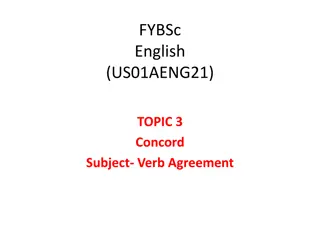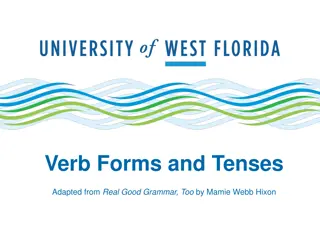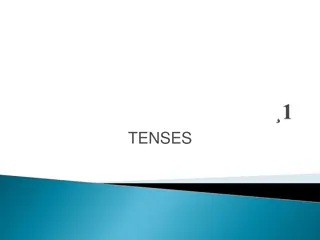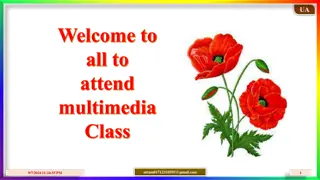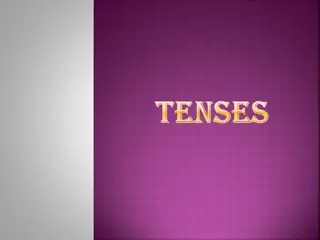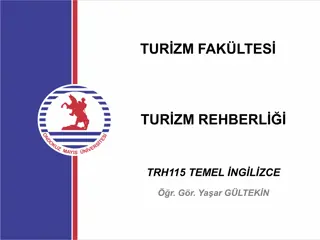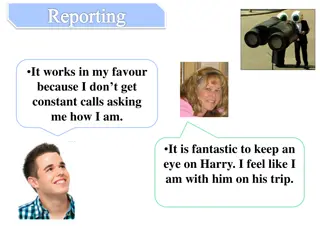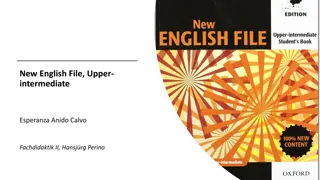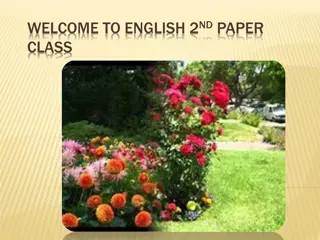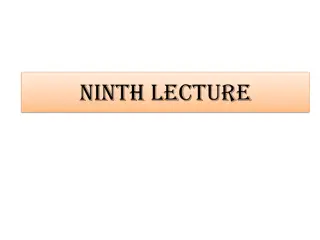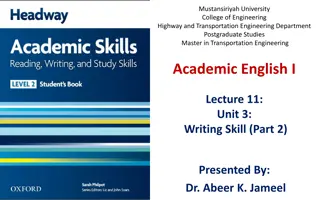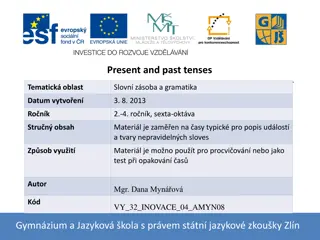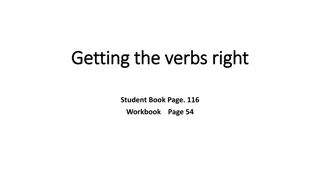Understanding Word Classes and Verb Tenses in English Grammar
Explore word classes like nouns, verbs, and adjectives, along with verb tenses such as present simple, past perfect, and future progressive. Learn about determiners, expanded noun phrases, and main and auxiliary verbs. Understanding these concepts is crucial for crafting sentences effectively in English.
Download Presentation

Please find below an Image/Link to download the presentation.
The content on the website is provided AS IS for your information and personal use only. It may not be sold, licensed, or shared on other websites without obtaining consent from the author. Download presentation by click this link. If you encounter any issues during the download, it is possible that the publisher has removed the file from their server.
E N D
Presentation Transcript
Word classes Noun phrases Verb tenses Adverbials Phrases and clauses Different sentence types
determiner determiner adjective adjective noun noun pronoun pronoun verb verb adverb adverb preposition preposition conjunction conjunction 4
Determiners the a my some this one all Determiners Adjectives big yellow beautiful strong old interesting hidden Adjectives Nouns dog book friend buildings England truth anger Nouns
These can be a single noun or a determiner and noun Expanded noun phrases add adjectives and are sometimes two noun phrases joined by a preposition The small cottage A beautiful flower Her old blue dress Some dusty books on a wooden shelf Write an expanded noun phrase about something you can see from where you are
Main verbs Auxiliary verbs These are to be , to have , to do and the modal verbs Modal verbs Verbs used to change the meaning of other verbs by indicating likelihood, ability, permission, and obligation. The main ones are will, would, can, could, may, might, shall, should, must and ought (Y5/6) Verbs often come in pairs to make verb phrases
Present simple Lucy plays tennis Past simple Lucy played tennis
Used to indicate actions that have been completed but where the effects of the actions are still relevant The present perfect - Uses have or has e.g. Lucy has played tennis The past perfect Uses had e.g. Lucy had played tennis The future perfect Uses will have e.g. Lucy will have played tennis
Used to describe continuing actions The present progressive - Uses am , are or is e.g. Lucy is playing tennis The past progressive Uses was or were e.g. Lucy was playing tennis The future progressive Uses will be e.g. Lucy will be playing tennis There are also perfect progressive forms!
Charlie is writing a sentence Charlie has written a sentence Emma skipped all the way home Vegetables are good for you Sam was cleaning the car Sam had finished his chores
quickly Later that day In the garden As she looked out of the window Before they left then often here 12
How? (adverbs of manner) slowly, quietly, happily, sadly, fast, well Where? (adverbs of place) outside, inside, home, away, here, there, everywhere When? (adverbs of time and frequency) now, then, next, soon, always, often, frequently How likely? (modal adverbs) definitely, clearly, rarely, surely, probably Adverbs can modify a verb (slowly dancing), an adjective (The match was really exciting) another adverb ( It doesn t happen very often) or a whole clause (Fortunately, the sun came out) 13
Adverbials which behave like adverbs ( often how, when or where) Adverbials are words, phrases or clauses They can sometimes be fronted the afternoon, the children played on the beach. fronted e.g. During Technically, adverbials can be single adverbs, prepositional phrases or subordinate clauses Add an adverbial to the sentence Alice walked through the forest
Co-ordinating conjunctions link words, phrases or clauses. Subordinating conjunctions link clauses together within a sentence because since while until when .. etc. and but or
Some adverbs can appear to do a similar job to conjunctions (i.e. linking ideas) and it can be difficult to tell them apart. Remember: Conjunctions link words, phrases or clauses within sentences An adverb can be used to link sentences or paragraphs together. The position of an adverb in a sentence is often flexible. Most words used to refer to different times (e.g. first, later) are adverbs within adverbs
One day, Goldilocks was walking through the woods when she spotted a small cottage. She plucked up her courage and headed towards it. Although she was nervous, she was also curious, so she went inside. Immediately she could smell porridge. Then, she saw the bowls on the table. Should she taste it or not? Next Goldilocks went into the living room, since she was feeling tired and wanted to sit down. She tried different chairs until she finally found a comfy one. Meanwhile the three bears were heading home, completely unaware of all this. Therefore they were shocked to discover the break-in.
determiner the a determiner adjective big adjective noun dog Rover noun pronoun pronoun it which verb Barked is was verb adverb slowly then away adverb preposition with at in preposition conjunction and when because conjunction 18
Sentence Clauses Phrases Words
Phrase - a group of words grammatically connected so that they stay together They expand a single word Noun phrase my old wardrobe Preposition phrase in my old wardrobe Clauses are groups of words with a subject and a verb They can be Main subordinate my old wardrobe in my old wardrobe verb She sneezed She sneezed
Simple sentence one clause Simple sentence Compound sentence two main clauses of equal weight, linked by a co-ordinating conjunction Compound sentence Complex sentence one main clause and one or more subordinate clauses (linked e.g. by a subordinating conjunction or relative pronoun) Complex sentence 22
Because Whenever Since Before While As After Until When Where ... And But Or Co-ordinating Subordinating
After she had eaten her breakfast, Sue got ready for work. James plays lots of sport because he enjoys keeping fit. Leeds, which is in Yorkshire, is a very interesting city.
A type of subordinate clause that modifies the noun (or another clause) usually by using relative pronouns e.g. Jack, who had chickenpox, stayed in bed. Try adding them in: Sally is a teacher. The castle is just outside London. Sometimes the pronoun might be ellipted improve flow e.g. The car I bought is lovely. ellipted to
Do you feel any more confident about your grammar subject knowledge? Do you have any questions? What are your next steps?



